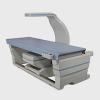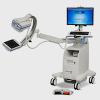Transforming Women's Healthcare with AI

Tim Simpson,
General Manager,
Hologic UK and Ireland
Women's healthcare urgently needs attention to address inequalities and improve outcomes, but how can AI contribute? Read General Manager Tim Simpson's thoughts.
Innovation in technology is set to shape healthcare in the future and as we look to bounce back from COVID-19, we need to explore how artificial intelligence (AI) will play a role and the potential to transform women’s healthcare.
While issues in women’s healthcare are not new, the COVID-19 pandemic has accelerated the need for urgency in improving health outcomes for women by tackling health inequalities, personalised screening and treatment, and an improved patient pathway.
Here, we look at the potential of transforming healthcare with AI technologies.
One Size Does Not Fit All
AI has potential to improve access to targeted and personalised diagnosis and treatment.
While AI has been adopted in some cancer screening programmes, what we now need to see is a move towards a prioritised, risk assessed screening system rather than a one size fits all approach.
Personalised screening will require the use of AI for risk stratification to identify high risk patients. We need to explore how AI can do this and how to use it to create a molecular profile to determine relative risk. For example, we know that women with dense breasts are at higher risk of developing breast cancer and that 40% of European women aged 40-74 years old have dense breasts.1 We need to ensure these women are identified early so that they can be prioritised for screening.
AI can also be adopted for personalised treatment. We’ve seen the development of a custom pessary for women affected by uterine prolapse.2 Using AI to get exact measurements and mould to a patient’s pelvic floor creates a custom design and moves away from relying on trial and error to fit a pessary which can often be unsuccessful.
In France, the RACE AI study is analysing how to use AI to identify patients with breast cancer at high risk of metastatic relapse.3 AI is able to identify risk looking at the patient’s clinical data combined with analysis of stained and digitized histological slides of the tumour.
This analysis then allows health care professionals to prioritise the best treatment plan and avoid unnecessary chemotherapy.
Improving Patient Care
Transforming healthcare with AI could also result in improved experiences for women in a surgical setting both preoperatively and intraoperatively.
While the use of AI is still in the early days there have been some promising developments. For example, in the Netherlands an AI-driven robot has been used during surgery to treat lymphedema, a common side effect of breast cancer treatment.4 Further adoption of AI could allow a move towards minimally invasive surgery options, this could be particularly beneficial for women with conditions such as endometriosis, where diagnosis currently involves removing tissue.
AI can also be used pre surgery to allow the surgeon to better map the body before operating using medical records and imaging to ensure successful surgery.5
Gaby Moawad, MD, FACOG, an Associate Professor of Obstetrics and Gynaecology, has spoken about the potential of AI in gynaecological surgery. He outlined that AI combined with virtual reality could help surgeons have a clearer visualisation of the anatomy, for example to visualise adenomyomas. Allowing surgeons to do more precise surgery and improve the quality of surgical care for patients.6
What’s Needed To Truly Transform Healthcare With AI
For AI to truly transform healthcare, datasets need to be built upon and be inclusive, taking into account all risk factors and not focusing on one specific demographic.
This will need collaboration, as shown recently between Kheiron Medical Technologies and Emory University. AI technology will evaluate data from mammograms on over 50,000 African American women.7 The aim is to reduce bias in the AI technology while also addressing the lack of representation of this demographic in research and AI development.
Access to diverse data sets allows deeper understanding of how disease progresses amongst different populations and is critical to ensure accurate and unbiased profiling of patients. The more data points you have, the bigger the database and the more accurate the AI.
While significant progress has been made in adopting AI to improve healthcare and as we build on innovations we must ensure collaboration between industry, clinicians, and researchers to unlock the full power of AI to radically improve women’s health and save lives.
















